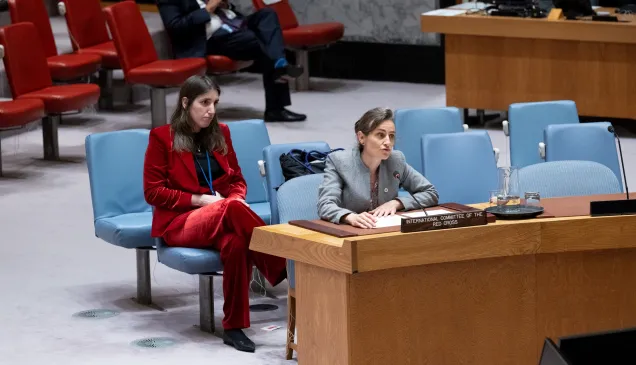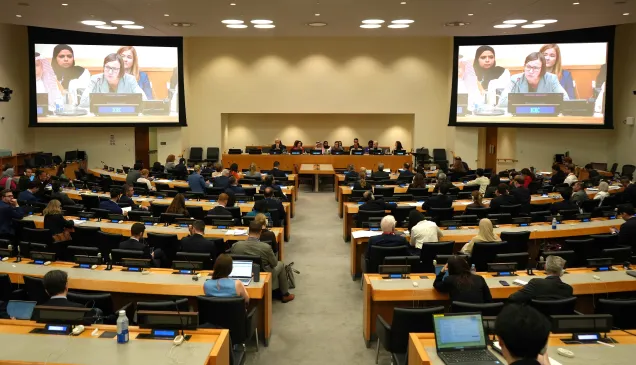Mr Chair.
As this is the first time that my delegation has taken the floor, let me, on behalf of the ICRC, thank you, Mr Chair, for your briefing this morning on the work of the Group of Governmental Experts (GGE).
The ICRC is grateful for this opportunity to share our general considerations regarding the work of the GGE.
We understood from the Chair's briefing that, pursuant to the GGE's mandate to "consider and make recommendations on substantial elements of an international legally binding instrument on the prevention of an arms race in outer space, including, inter alia, on the prevention of the placement of weapons in outer space", experts within this Group considered the evolving nature of outer space activities and space threats.
This is indeed timely, as the continued militarization and the possible weaponization of outer space increase the risk of space systems – be they military in nature or dual-use – being targeted during armed conflicts, resulting in potentially significant harm to civilians relying on space-based services.
Against this backdrop, a clear and strong reaffirmation that military operations in, or in relation to, outer space do not occur in a legal vacuum, but are constrained by existing international law, is critical to fulfilling the GGE's mandate. To this end, a new international legally binding instrument should recall that international law applies to outer space.
This includes all the existing rules prohibiting or restricting weapons, means and methods of warfare in, or in relation to, outer space, including the United Nations (UN) Charter, treaties on outer space, and international humanitarian law (IHL), as well as international treaties in the field of disarmament and arms control, and the law of state responsibility, where relevant.
We understand that the discussion on the applicability of IHL to outer space may have raised concerns over the possible legitimization of the use of force in space, among others. These are important considerations, which are addressed by Protocol I of 8 June 1977 additional to the Geneva Conventions. In particular, the Protocol states that IHL cannot "be construed as legitimizing or authorizing any act of aggression or any other use of force inconsistent with the Charter of the United Nations".
This could be reaffirmed in a new international legally binding instrument on the prevention of an arms race in outer space (PAROS).
Indeed, IHL and the UN Charter are complementary: any resort to force by states, including in outer space, always remains governed by the prohibition of the threat or use of force under the UN Charter. In fact, IHL further contributes to the PAROS agenda as it contains rules that prohibit or limit the development and use of weapons, means and methods of warfare.
Mr Chair,
As a humanitarian organization, the ICRC is concerned primarily with the potential human cost to civilians of the use of weapons and of other military operations in, or in relation to, outer space. Given the increasingly indispensable role of space systems in the provision of essential civilian services, humanitarian considerations should be a cornerstone of any multilateral discussion and of any normative development with regard to space security, including within the framework of this GGE.
It is, in our view, essential for the outcome of this GGE to acknowledge the importance of the provision of critical space-based services to civilians and to humanitarian operations, to consider further measures to minimize the significant risk of civilian harm arising from threats to space systems, and to strengthen the protection of civilians from the harmful effects of military space operations.
In our view, such a humanitarian approach also contributes to trust-building in connection with the PAROS agenda: any measures aimed at preventing disruption to, or damage or destruction of, space systems, in particular those supporting the provision of essential services on Earth, would be beneficial to the safety and security of both nations and their civilian populations.
Firstly, space systems will often be afforded protection under existing international law, such as the prohibition of attacks on civilian objects and the special protection afforded by IHL to specific persons and objects during armed conflicts. Building upon these protections, and in light of the significant risk of civilian harm and possible escalatory effects, a new international legally binding instrument could require states to refrain at all times from conducting and/or supporting any military operation or other activity designed or expected to disrupt, damage, destroy or disable space systems necessary for the provision of essential civilian services and for the protection and functioning of persons and objects specifically protected under international law.
Such systems include those that are critical to the production and maintenance of objects indispensable to the survival of the civilian population or that otherwise enable the delivery of essential civilian services, such as foodstuff, crops, livestock, drinking-water installations and supplies, irrigation works, and electricity and communications systems; those necessary for the protection and functioning of persons and objects specifically protected under international law, such as astronauts, humanitarian relief personnel and objects, civil defence organizations, cultural property, the natural environment, and medical personnel, activities and facilities; and those critical to the safety and operation of works and installations containing dangerous forces, such as nuclear power plants or infrastructure containing hazardous or toxic materials.
For the purpose of reinforcing this protection, states may consider including elements on the identification, registration, marking, announcement or other indication of these space systems and, whenever feasible, on the physical or technical separation or segmentation of the civilian use of space systems from their military use.
Secondly, an international legally binding instrument could include prohibitions on the development, testing and use of kinetic counterspace capabilities and other harmful operations that are designed or expected to create space debris.
Thirdly, an international legally binding instrument could include measures of international cooperation to increase the resilience of space-based services that humanitarian relief and emergency response efforts rely on in times of armed conflict and other emergencies.
Mr Chair,
We note that experts within this GGE have considered the existing legal and normative framework to be insufficient to prevent an arms race in outer space. In light of this, and in view of the significant risk of civilian harm, as the ICRC has repeatedly stated, states may decide to set general prohibitions or specific limits with regard to weapons, hostilities or other military operations in, or in relation to, outer space for a range of reasons, and humanitarian impact should not be missing among them.
We are grateful to have been offered the opportunity to provide some recommendations for the GGE to consider in this respect.
In any event, substantive elements of an international legally binding instrument must be consistent with, and build on and strengthen, the existing legal framework, including IHL.
We thank you for your attention and stand ready to lend our expertise to any future discussion of the GGE.
Thank you.




